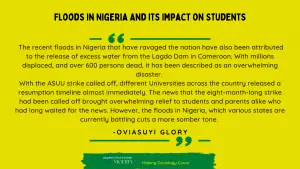For decades, Nigeria’s public education system, particularly at the primary and secondary levels, has been plagued by neglect, mismanagement, and underinvestment.
This decline has had far-reaching effects, with public schools becoming the sole option for the underprivileged while wealthier Nigerians and politicians avoid them in favor of private institutions.
Unfortunately, the result has been the progressive decay of a system that was originally designed to serve as a foundation for the nation’s future.
State of Public Education in Nigeria
According to UNESCO, countries should ideally allocate at least 15–20% of their national budget to education. Nigeria, however, has historically allocated around 6–8% of its annual budget to education, which is significantly below the recommended amount. This underfunding contributes to poor infrastructure, lack of resources, and inadequate teacher training in public schools.
A report from the Nigerian Education Data Survey (NEDS) found that over 40% of public primary schools lack basic infrastructure such as potable water, electricity, and proper sanitation facilities. These conditions make it challenging for children to focus on learning and impact overall educational outcomes.
Nigeria faces severe teacher shortages in public schools, with a teacher-to-student ratio of approximately 1:45 in primary schools, far above the UNESCO recommended ratio of 1:25. The lack of qualified teachers directly affects the quality of education that students receive, particularly in rural areas.
A Tale of Neglect: Public Education’s Unfulfilled Potential
It’s a striking paradox that, despite the wide network of public primary schools across Nigeria, with at least one in every community or village, these institutions are failing.
Unlike many nations where the lack of schools is a barrier, Nigeria’s problem is largely one of poor management and the absence of a cohesive strategy to maintain or improve public education.
Many communities have watched as these institutions, once envisioned as community anchors, deteriorated year after year.

The Economic Shift: New Challenges in Access to Education
Recently, Nigeria’s economic landscape has shifted, making it increasingly challenging for families to sustain themselves, much less afford private school fees or the transportation costs to access quality education.
The worsening economy has strained household finances, leading many families to reconsider public schooling.
Nigeria’s poverty rate, which the World Bank estimated at around 40% in recent years, limits families’ ability to afford private schooling.
This means that many families must rely on public schools, yet these are often under-resourced and neglected. As the economy worsens, families are increasingly turning to public schools, where costs are theoretically lower, but quality remains an issue.
Nigeria has been experiencing high inflation rates, which reached over 24% in 2023, according to the National Bureau of Statistics.
This increase in the cost of goods and services further reduces disposable income, limiting families’ ability to afford private school fees and transportation to distant schools. This economic shift is pushing more families to consider public education.
Unfortunately, as these schools have been left to crumble, families now face a dilemma: enroll their children in poorly maintained public schools or stretch beyond their means to afford private options
The Consequences: How Neglecting Public Education Affects Communities
The neglect of public education has consequences that go beyond individual students; it affects entire communities.
When the only available educational institutions are under-resourced and substandard, communities lose out on the developmental benefits that come with a well-educated population.
Public schools, in theory, should help equip local youth with the skills and knowledge needed to contribute to and uplift their communities. When schools are underfunded and mismanaged, however, they fail to fulfill this role, stalling local progress.
Poor public education also impacts other social and economic indicators. For example, communities with limited access to quality education often experience higher unemployment rates, increased crime, and limited access to opportunities that require a basic level of education.
The World Bank suggests that every additional year of schooling can increase a person’s earnings by about 10%. Improving public education in Nigeria, especially at the foundational level, would likely contribute to higher earning potential among students, fostering economic growth at the community level.
Data shows that educated individuals are more likely to participate in community development projects and local governance. A UNICEF report highlighted that communities with higher levels of education tend to have better health, lower poverty rates, and stronger local economies.
A strong public education system could potentially reduce poverty rates by providing children with essential skills, which, in turn, fosters economic growth and reduces reliance on government aid.
The Need for Reform: Investing in Public Education as a Pillar of Community Development
It is now crucial for policymakers, community leaders, and citizens to recognize the importance of public education in community development.
Improving Nigeria’s public schools would not only provide children with the skills they need but would also be a powerful investment in the future of the communities they serve.
Here are several key areas for reform:
1. Improving Infrastructure and Resources:
Schools must have safe, clean facilities and adequate learning materials. This investment ensures students can learn in an environment that values their dignity and potential.
2. Community Involvement and Ownership:
Instead of seeing public schools as a last resort, communities could actively invest in the improvement of their local schools, whether through volunteer work, local fundraising, or advocacy for better funding. Building community pride in these institutions could go a long way toward reversing years of neglect.
3. Teacher Training and Support:
Quality education depends on qualified, motivated teachers. Providing professional development, adequate salaries, and resources for teachers would improve the quality of instruction and create a supportive environment for learning.
4. Accountability and Transparency in Funding:
Improved management of public school funds is essential. Ensuring that funds earmarked for public education reach their intended targets will help communities trust in the public system again.
Reclaiming Public Education: A Path Forward
Ultimately, it is essential to reclaim Nigeria’s public schools as institutions of pride and purpose.
The decision to improve public education should not be left solely to the government. Communities, parents, and individuals can all play a part in revitalizing these institutions.
By working together, Nigeria can create a public education system that is not only accessible but also capable of uplifting entire communities.
The current situation, where Nigerians can no longer afford private alternatives and are forced to confront the consequences of decades of neglect, serves as a call to action.
Investing in a robust, inclusive public education system will not only improve the lives of individual students but will also lay a solid foundation for sustainable community development.
Through collective effort and strategic investment, the dream of a strong, community-centered public education system can become a reality in Nigeria.







